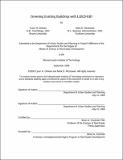Greening existing buildings with LEED-EB!
Author(s)
Dirksen, Tyson H; McGowan, Mark D
DownloadFull printable version (437.1Kb)
Alternative title
Greening existing buildings with Leadership in Energy and Environmental Design-Existing Buildings!
Other Contributors
Massachusetts Institute of Technology. Center for Real Estate.
Advisor
Brian A. Ciochetti.
Terms of use
Metadata
Show full item recordAbstract
The market of existing office buildings is going green. While early adopters of green buildings were owner-occupiers, there is a current wave of nonowner-occupied office buildings seeking Leadership in Energy and Environmental Design (LEED) for Existing Buildings certification. This thesis examines the current context in which this dramatic change is transpiring as well as answers the following questions as they relate to this green transformation of existing multitenanted office buildings: * Who is participating? * Why are they participating? * What is the process? * What are the costs? * How is it being financed? Research conducted included literature review and interviews with building owners, property managers, building engineers and brokers in several major metropolitan office markets in the United States. This thesis examines green building rating systems from around the world. We focus on the LEED rating system, the most widely used in the United States, as it provides a good framework for owners and managers to evaluate and benchmark the environmental performance of their building. Our research indicates that a much higher percentage of Class A office building owners and managers are pursuing LEED for Existing Building (LEED-EB) certification, while Class B owners and managers are not. Class B owners face less incentives and greater obstacles when pursuing LEED-EB certification. In chapter four of this thesis, we explore two creative ways that Class B owners and managers may be able to overcome some of these hurdles - Energy Savings Performance Contracts (ESPCs) and Power Purchase Agreements (PPA).
Description
Thesis (S.M. in Real Estate Development)--Massachusetts Institute of Technology, Dept. of Urban Studies and Planning, Center for Real Estate, 2008. This electronic version was submitted by the student author. The certified thesis is available in the Institute Archives and Special Collections. Includes bibliographical references (p. 88-92).
Date issued
2008Department
Massachusetts Institute of Technology. Center for Real Estate; Massachusetts Institute of Technology. Department of Urban Studies and PlanningPublisher
Massachusetts Institute of Technology
Keywords
Urban Studies and Planning., Center for Real Estate.